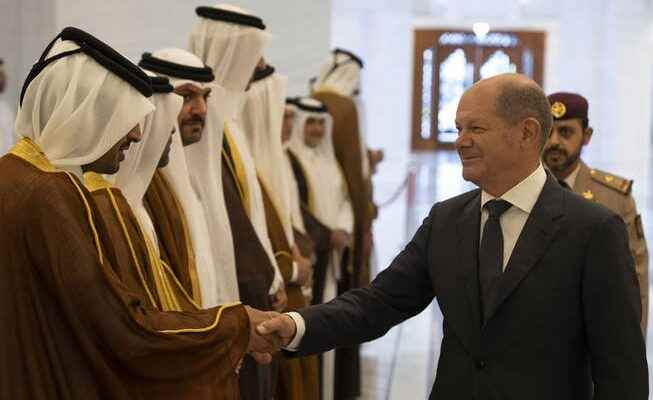At least the German chancellor doesn’t return empty-handed from Arabia: Abu Dhabi wants to deliver gas to Germany in the future. Apart from that, like other petitioners from Europe, he has a difficult time in the Gulf.
It is unlikely that Scholz’ trip will secure Germany’s energy needs, despite the success story from Abu Dhabi.
Joe Biden had been there, as had Emmanuel Macron and Boris Johnson. On Saturday it was finally Olaf Scholz’s turn. Like all Western statesmen before him, the Chancellor walked the purple carpet that the Saudi rulers roll out to greet their visitors at Yidda Airport.
Scholz’s arrival in the port city on the Red Sea, where the Saudi kings spend the summer, was the prelude to a lightning visit to the Gulf: the Chancellor traveled from Saudi Arabia to the United Arab Emirates the same evening. On Sunday afternoon he quickly paid his respects to the Emir of the World Cup hosts Qatar before heading back to cold and wet Berlin.
LPG from Abu Dhabi
The Chancellor was able to report at least one success on his return: the United Arab Emirates, it was said, would in future be supplying liquefied natural gas to Germany. A first load of 137,000 cubic meters is expected in December in Brunsbüttel’s provisional gas terminal.
In addition, the German energy group RWE and the state oil company of Abu Dhabi agreed on a memorandum on future gas deliveries. In 2023, additional diesel will flow from Qatar to Germany. In addition, Scholz was able to present a whole range of other business deals from German companies.
In doing so, the chancellor had achieved more than his economics minister, Robert Habeck, who failed in the spring when he tried to negotiate a gas partnership in Qatar. At that time, a much-announced deal turned out to be nothing more than a declaration of intent.
The Europeans are supplicants in the Gulf
It is unlikely that Scholz’ trip will secure Germany’s energy needs, despite the success story from Abu Dhabi. The agreed delivery covers only a fraction of German gas consumption. In addition, most of the Gulf States hardly have the capacity to produce additional natural gas in the short term and mostly supply their currently available raw materials to Asia, where they are tied to long-term contracts.
At present there will be no salvation for Europe from Arabia. Scholz seems to have guessed that before he left. The Chancellery has repeatedly emphasized that the trip is not a fossil shopping tour. Instead, they want to talk to their partners in the Gulf about future cooperation. The announcements talked a lot about “joint projects” or “renewable energies”, and Scholz was accompanied by well-known representatives of German industry.
However, these fine words cannot hide the fact that Olaf Scholz – just like all the other Western politicians who have made a pilgrimage to the Gulf in recent months – is considered a petitioner by the petrostates. The rulers of the oil and gas monarchies know very well that the Europeans are desperate and urgently need friends because of the lack of Russian gas supplies as a result of the Ukraine war.
The crown prince cannot be taught
They are correspondingly self-confident. Scholz reprimanded the all-powerful Saudi Crown Prince Mohammed bin Salman for the death of journalist Jamal Kashoggi, who was murdered by Saudi agents in Istanbul in 2018. But the prince, who was therefore long considered a non-person in the West, rolls off such instructions. At least since Joe Biden’s visit to Saudi Arabia two months ago, he has considered himself rehabilitated.
Bin Salman, who rules at home with an iron fist, can afford it. The high price of oil brought him record earnings, and most recently he was also able to present himself as a world politician as part of an exchange between Ukrainian and Russian prisoners of war. To this day, Saudi Arabia and the other Gulf states refuse to sever relations with Russia. Gone are the days when the oil monarchies stood by their guns when the West needed them.
This also applies to the Germans. Berlin is currently not delivering any weapons to Saudi Arabia, according to a request from the left-wing faction in the Bundestag. But it will be difficult in the future to refuse one or the other favor to the Saudi, who is just bursting with strength. Especially since German exports to the Kingdom have halved since 2015.
A journey dedicated to realpolitik
Scholz’s trip to Arabia was therefore dominated by the realpolitik that has brutally caught up with Europeans since the Ukraine war at the latest. In view of the looming energy crisis at home, he had little choice but to pay his respects to the autocratic Gulf regimes.
At least this time the chancellor benefited from his often scolded hesitancy in foreign policy. Because Scholz only traveled to the Gulf after everyone else, he was able to greet the Saudi crown prince with a firm handshake, in contrast to Joe Biden and his much-discussed hesitant fist bump. The others had already rehabilitated him.
